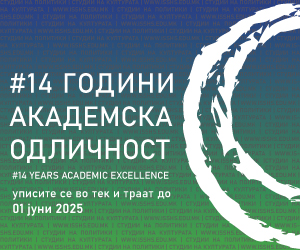As is known, CIVIL has been participating in the Week of the Circular Economy in the Western Balkans for three years in a row, with its quality contribution to strengthening public awareness of the importance and perspectives of the green, i.e. circular economy in North Macedonia, with important questions to relevant representatives of our society and institutions in terms of improving the environment, always taking into account both the regional and global context as far as green policies are concerned, pointed Diana Tahiri –CIVIL at the conference “Perspectives of the circular economy in conditions of war and insecurity”, which was held within the framework of the Week of Circular Economy in the Western Balkans, 2024.
This year, our organization is focusing on identifying the challenges posed by wars, conflicts and other crises such as the Russian aggression against Ukraine, the hybrid war against the West and the conflict in the Gaza Strip.
Starting Monday, 27 May, CIVIL’s media platform has published educational contents related to the circular economy, with the following titles: What is Circular Economy, What is the difference between Circular and Green Economy, What is Green Politics, The two faces of nationalism – from liberal to extremist ideology, What is global responsibility?
On all these topics and more, CIVIL last year issued a publication in three languages – Visions for a Green Future, which is available online on the media platform Green CIVIL.
We have also conducted series of interviews focusing on the prospects of this economic area of the future.
As you had the opportunity to see at the beginning of today’s event, one of the interviewees was the Deputy Prime Minister for Economic Affairs, Fatmir Bytyqi, an expert in strategic planning and management of development, economic and business programs. In the extremely interesting interview, he gave very interesting answers to questions about the importance of regional cooperation, current trends and opportunities offered by the green economy, North Macedonia’s path to the green transition.
“The military conflict had more negative than positive implications, in the segment of the circular economy, not only our country but also the businessmen began to see that it is not possible to create independence in any sector and to profit from it only as an isolated state, pointed out among the other Bytyqi, regarding the impact of military conflicts on the circular economy.
Еnvironmentalist and political analyst Toni Popovski, wrote regarding the effect of wars and military-security crises and polarization on the possibilities of the circular economy becoming a dominant trend in the world economy.
Prof. Dr. Ognen Marina, at the Faculty of Architecture says that in order to achieve sustainable urban development, it is necessary to change the paradigm through which we perceive, analyze, understand and explain the world around us and the built environment, and then start organizing our life on completely new grounds and the development of human communities, including cities.
An indirect consequence of the military and related crises is the deprioritization of the circular economy at the expense of urgent investments to help the population and to rebuild the infrastructure, although that rebuilding is also desirable to be carried out on the basis of the principles of re-use of materials, especially in the construction sector, says environmentalist and political scientist Toni Popovski in his interview.
Regional initiatives can be very amenable to green policies, especially given that green policies fall within the spectrum of progressive and liberal policies, said the National coordinator for Open Balkans and for regional initiatives, Marjan Zabrchanec.
Lenche Nikolovska, the head of “Agroteam” indicated that for any investor, whether domestic or foreign, the policy of the current government, the measures that are taken and the stability in the country are important. When the government is unstable, companies are cautious and avoid long-term investments in green technologies and infrastructures.





